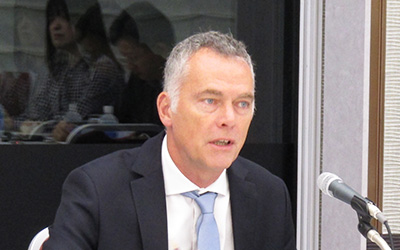Keidanren

On October 25, Keidanren held a meeting with Head of the OECD Trade Policy Division John Drummond at Keidanren Kaikan in Otemachi, Tokyo. Mr. Drummond explained OECD's trade agenda in a changing world and exchanged views with participants. The following is a summary of his presentation.
Multilateral trading system under stress
For the past several decades, free market was considered a source of economic growth. However, due to supply chain disruptions caused by COVID-19 and Russia's invasion of Ukraine, some argue that safety and reliability should be more important than efficiency.
However, the OECD monitors global supply chains through trade data, and there is no strong evidence of de-globalization. Trade policy decisions should be based on evidence and data, not ideology, and the OECD can contribute in this regard.
Trade agenda for the OECD
The OECD's Trade Committee prioritizes (1) sustainable and resilient supply chains, (2) level playing field, (3) digital trade, (4) trade in services, (5) sustainable trade, and (6) inclusive trade.
Regarding (1) sustainable and resilient supply chains, the supply of critical raw materials necessary for green transformation or digital transformation is concentrated to several countries, and it is important to find alternative sources#1 #2. The OECD is encouraging resource-rich countries not to take export control measures and is considering international disciplines regarding export control measures.
(2) Ensuring a level playing field is a precondition for free and fair trade. Market-distorting subsidies and loans at below-market financing distort fair competition. While the WTO's notification obligation on subsidies has become a formality, the OECD is developing a database to monitor subsidies in each country#3. In discussions of subsidies, attention tends to focus on industrial subsidies, but agricultural subsidies also need to be discussed.
(3) Regarding digital trade, the OECD is concerned that while the volume of data flowing across borders is increasing, so are the barriers. Regarding the moratorium on tariffs on electronic transmissions, the OECD points out that the revenue from the tariffs will be smaller than the revenue loss due to the disincentive to investment caused by the ban of moratorium.
(4) Regarding trade in services, we would like to continue to emphasize its importance as it is indispensable to advance GX and DX. (5) Regarding sustainable trade, we have heard concerns about the method of measuring the carbon content of products, etc. We would like to prepare a report that takes into account the opinions of companies. Regarding (6) inclusive trade, it is important to fairly distribute the fruits of trade, including to workers.
In the discussion, a participant pointed out that subsidies are problematic in ensuring a level playing field, but contributes to other issues such as sustainability and resilience. Mr. Drummond responded that if governments provide subsidies for legitimate purposes, it is important to minimize adverse effects by ensuring transparency and non-discrimination.
- Strengthening clean energy supply chains for decarbonisation and economic security
https://www.oecd.org/trade/topics/global-value-chains-and-trade/documents/
clean-energy-supply-chains-OECD-G7-202305.pdf - Security of supply for critical raw materials
https://www.bundesregierung.de/resource/blob/
974430/2059152/913f41a5d52c8aa68b1bb0e03176879d/
2022-07-01-security-of-supply-for-critical-raw-materials-data.pdf - Government support in industrial sectors
https://read.oecd.org/10.1787/1d28d299-en?format=pdf

